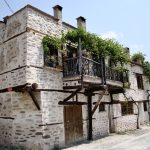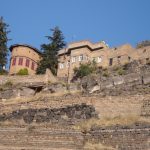You won’t have been in the country for long before you realise that Turkey is not the cheap travel destination it once was. This is partly because the cost of living has skyrocketed over the last decade as the country modernised but also because many of those working in tourism have, quite understandably, moved upmarket over the years to try and maximise their profits. Post-Covid hotel prices have shot up as hoteliers try to recoup some of their losses. At the same time entrance fees for attractions have also soared, with differential pricing working against foreign visitors.
Petrol costs are some of the highest in the world which inevitably feeds through not only into public transport fares but also into the cost of everything that has to be transported. Electricity and gas prices are high for businesses which explains why hoteliers are reluctant to slash rates in winter. Alcohol is subject to punitive “sin taxes” which means that that glass of wine with your meal can almost double the cost.
But don’t despair. It is still possible to travel cheaply here and there are certainly lots of ways to keep costs to a minimum especially if you stay away from İstanbul and the coastal hotspots. Travelling in Eastern Turkey is much cheaper than travelling in the west once you’ve absorbed the cost of getting there; this is especially true of eating out which is often blissfully cheap especially in the alcoholic deserts of Diyarbakır and Şanlıurfa.
It’s also much cheaper to travel round the inland towns of Western Anatolia. Places like Sivrihisar, Göynuk and Akşehir see few foreign tourists and offer inexpensive stays to those who do pass through. Competition for the shrinking backpacker market has also kept prices down at the family-run pensions of Selçuk (for Ephesus), Olympos, Antalya (Kaleiçi) and Göreme (Cappadocia).
As yet Turkey doesn’t offer reduced prices for return bus or plane trips. However, public transport within towns is cheap by international standards and travel by train can also be a bargain – even non-Turks over 65, for example, qualify for half-price train tickets for the time being. An increasing number of museum cards offer marginally reduced admission to the main attractions although you need to do the maths carefully and not be deceived bythe inclusion of sights that turn out to be closed for restoration, for example.
Here are ten general suggestions for keeping costs to a minimum:
- Travelling by train is cheaper (but slower) than taking the bus. Check first that the station is actually in the town centre so that you don’t end up having to pay a taxi fare to get there. And beware (relatively) pricy high-speed routes like those linking İstanbul, Ankara and Eskişehir.
- Book internal flights well ahead to get the best prices – midweek is likely to be cheaper than travelling at the weekend (including Monday and Friday). Prices are keenest on routes where Turkish Airlines flies in competition with Pegasus or Sun Express. Over Turkish public holidays, including religious holidays, prices soar.
- Never buy food for your journey at the bus station (let alone the airport) as prices are usually double those elsewhere. And remember that bus conductors often come round with tea or coffee immediately AFTER you stop for a meal break, so you may not need to buy a drink at all.
- Always check whether there is a servis, a free transfer to the town centre, before hailing a taxi at the bus station.
- If you’re staying put in any of the big towns for a while you can usually a local travelcard offering slightly discounted fares. However, there is usually a non-returnable deposit for the card which may wipe out the saving on a short stay. In İstanbul holders of an İstanbulkart pay less for transfers along the way.
- It used to be standard to ask for an indirim (discount) in business class hotels, especially if staying for more than one night. However since the advent of booking.com many hotels will not budge on their prices and to get the best deal you will have to use the booking service. Within Turkey this is not allowed so you will need a VPN to be able to access the best deals.
- If your hotel doesn’t do breakfast opt for a bowl of mercimek çorbası (lentil soup) in a lokanta which will be served with enough bread to keep you going all day. A glass of çay is often thrown in too.
- Shopping in chain supermarkets (Migros, Carrefour, etc) helps you keep control of costs as the prices are always clearly marked. Bim, Şok and A101 are the discount leaders – limited range but keenest prices.
- These days bargaining is not usual unless you are buying in bulk. The glaring exception is if you are shopping in İstanbul’s Kapalı Çarşı (Covered Bazaar) where it would be unwise (foolish even) to accept the first price offered.
- If you need to take a taxi to an off-the-beaten-track site always negotiate a price inclusive of the round trip plus waiting time with the driver before setting off. Over long distances the meter price is likely to work out more expensive.
- Steer clear of alcohol if you can and be careful about ordering fish in particular without checking the price carefully first (although these days meat is pretty pricy too). In theory it should be a good idea to go veggie although restaurant prices for non-meat dishes are not always noticeably cheaper. Besides, outside the big towns meat makes up the vast majority of what’s on offer.
Finally, while it’s never especially wise to recommend hitchhiking because of its obvious intrinsic risks, word is that Turks are still just as happy as they ever were to give free lifts to the impecunious especially in rural areas where public transport is thin on the ground.
And there’s always couchsurfing if things get really tough. Users report having been able to find free bed and board all over the country, usually offered by professional, middle-income Turks with extra space in their homes.

